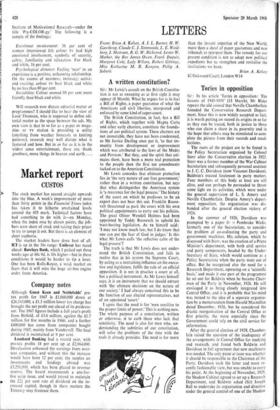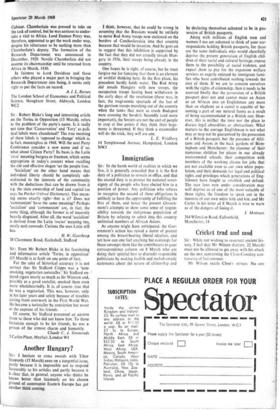Tories in opposition
Sir : In his article 'Tories in opposition: The lessons of 1945-1951' (15 March), Mr Blake repeats the old canard that Neville Chamberlain founded the Conservative Research Depart- ment. Since this is now widely accepted as fact, it is worth putting on record its origins in so far as they can be traced, bath in justice to those who can claim a share in its paternity and in the hope that others may be stimulated to com- plete the picture from their records and recol- lections.
The roots of the project are to be found in the Policy Secretariate organised by Colonel Storr after the Conservative election in 1923. Storr was a former member of the War Cabinet Secretariate and subsequently personal assistant to J. C. C. Davidson (now Viscount Davidson). Baldwin's trusted lieutenant in party matters. Four members of this body at least are still alive, and can perhaps be persuaded to throw some light on its activities, which were under the general supervision of L. S. Amery and Neville Chamberlain. Despite Amery's depart- ment opposition, the organisation was dis- banded after the general election victory of 1924.
In the summer of 1926, Davidson was prompted by a paper fr. -n Pembroke Wicks, formerly one of the Secretariate, to consider the problem of co-ordinating the party and government machines. His solution, which he discussed with Storr, was the creation of a Prime Minister's department, with both civil service and party components, headed by the Under- Secretary of State, which would continue as a Policy Secretariate when the party went out of office. But he recognised also the need for a Research Department, operating on a 'scientific basis,' and made it one part of the programme he set out for Baldwin when he became Chair- man of the Party in November, 1926. He still envisaged it as being closely integrated into Central Office, and it is probable that his mind was turned to the idea of a separate organisa- tion by a memorandum from Harold Macmillan dated December, 1926, but he considered the drastic reorganisation of the Central Office as first priority, the more especially since the Government could rely on the civil service for information.
After the general election of 1929, Chamber- lain raised the question of the inadequacy of the arrangements in Central Office for studying and research, and found both Baldwin and Davidson in full agreement that new machinery was needed. The only point at issue was whether it should be responsible to the Chairman of the Party. Davidson took the latter and more re- cently fashionable view, but was unable to-carry his point. At the beginning of November, 1929, the Shadow Cabinet agreed to set up a Research Department,. and Baldwin asked (Sir) Joseph Ball to undertake its organisation and direction under the general control of one of the Shadow
Cabinet. Chamberlain was pressed to take on the task of control, but he was anxious to under- take a visit to Africa. Lord Eustace Percy was, therefore, appointed to get the work under way, despite his reluctance to be nothing more than Chamberlain's deputy. The formation of the Research Department was announced in December, 1929. Neville Chamberlain did not assume its chairmanship until he returned from Africa in March, 1930.
In fairness to Lord Davidson and those others who played a major part in bringing the Research Department into being, it seems only right to put the facts on record.
A. I. L. Barnes The London School of Economics and Political Science, Houghton Street, Aldwych, London WC2







































 Previous page
Previous page